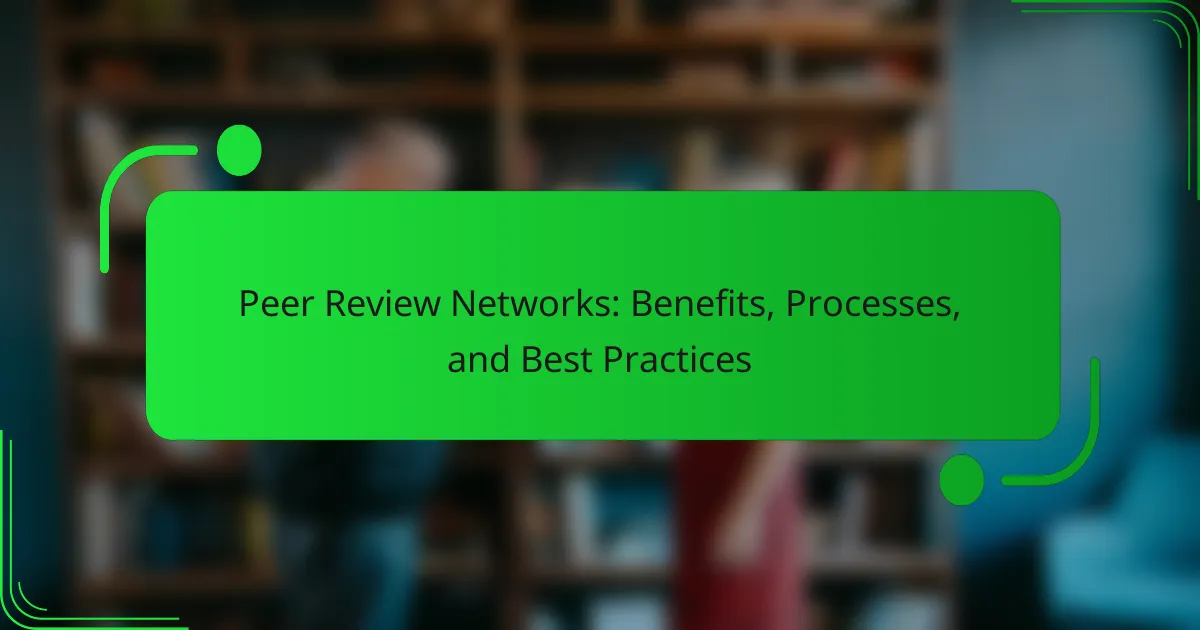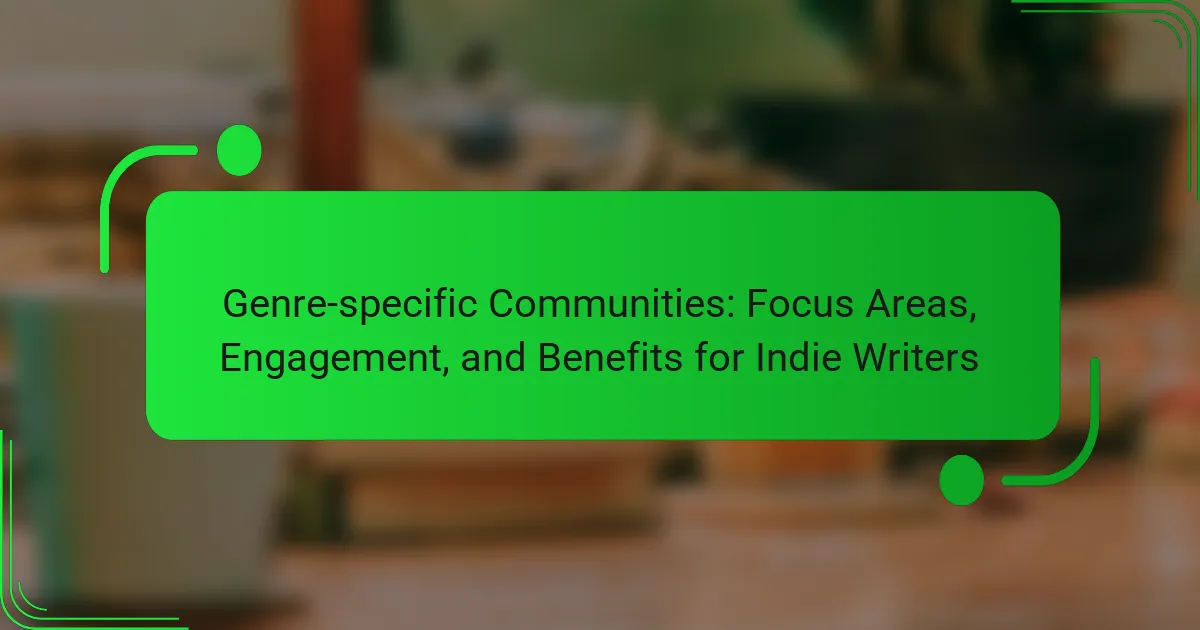Author collaborations can significantly enhance creativity and broaden audience reach for writers. This article explores various types of collaborations, such as co-authoring and anthology contributions, and discusses their advantages. It also provides practical steps for getting started, including identifying potential partners and establishing clear communication. Understanding the challenges and unique attributes of these partnerships is essential for successful collaboration.
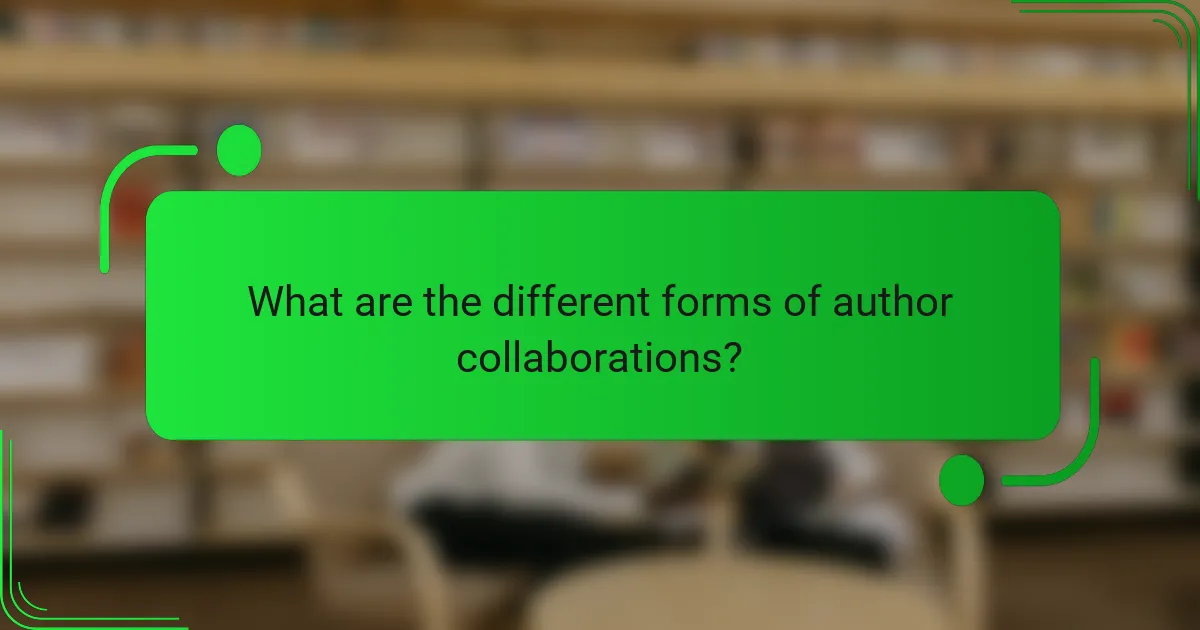
What are the different forms of author collaborations?
Author collaborations can take various forms, each offering unique advantages. Common types include co-authoring, where two or more writers jointly create content, and anthology contributions, where multiple authors contribute individual pieces to a collective work. Other forms include ghostwriting, where one author writes on behalf of another, and collaborative blogging, where authors share a platform to discuss topics. Each type enhances creativity and broadens audience reach, making collaboration a valuable strategy for authors.
How do co-authoring projects differ from anthology contributions?
Co-authoring projects involve multiple authors working together on a single piece, while anthology contributions consist of individual authors submitting separate works compiled into a collection. Co-authoring fosters collaboration and shared creativity, leading to a unified voice. In contrast, anthologies showcase diverse styles and perspectives, highlighting each author’s unique contribution.
What role do ghostwriters play in author collaborations?
Ghostwriters play a crucial role in author collaborations by providing expertise and writing skills that enhance the final product. They help authors articulate their ideas, maintain a consistent voice, and meet deadlines. This collaboration allows authors to focus on their core strengths while leveraging the ghostwriter’s proficiency in storytelling and structure. Additionally, ghostwriters can bring fresh perspectives and creativity, enriching the overall narrative. Their involvement often leads to a more polished and engaging book, ultimately benefiting both parties in the collaboration.
Which platforms facilitate collaborative writing?
Several platforms facilitate collaborative writing, enabling authors to work together efficiently. Google Docs allows real-time editing and commenting. Microsoft Word Online offers similar features with a familiar interface. Dropbox Paper combines document creation with task management tools. Notion provides a flexible workspace for notes and writing. Finally, Scrivener supports collaboration through shared projects, enhancing the writing process.
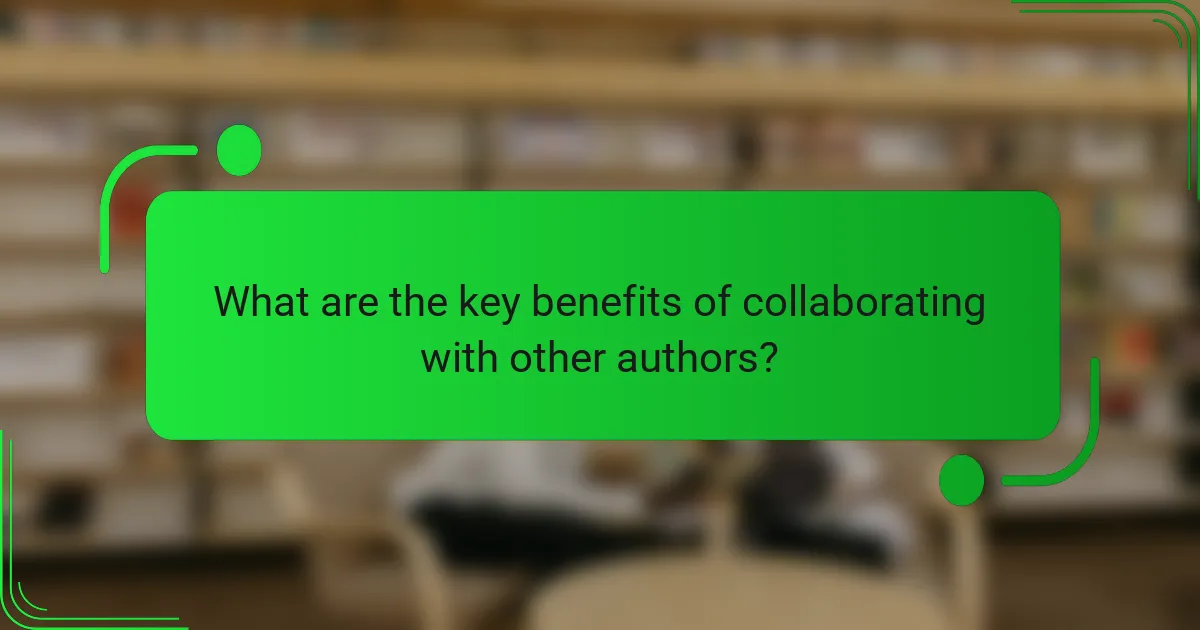
What are the key benefits of collaborating with other authors?
Collaborating with other authors enhances creativity, expands reach, and fosters learning. These partnerships can lead to innovative ideas, increased audience engagement, and shared resources. Additionally, collaboration builds a supportive community, offering diverse perspectives that enrich the writing process.
How can author collaborations enhance creativity and innovation?
Author collaborations can significantly enhance creativity and innovation by combining diverse perspectives and expertise. Collaborating with other authors fosters idea exchange, leading to unique insights and fresh concepts. This synergy often results in more engaging content and innovative storytelling techniques. Additionally, shared resources and skills can streamline the writing process, allowing for exploration of new genres or styles. Overall, author collaborations create a dynamic environment that nurtures creativity and drives innovation.
What advantages do collaborations offer for marketing and audience reach?
Collaborations enhance marketing and audience reach by leveraging shared resources and networks. They allow authors to tap into each other’s audiences, increasing visibility and credibility. Collaborations can lead to innovative content, combining diverse perspectives that attract broader interest. Additionally, joint promotions often result in cost savings and higher engagement rates.
In what ways can partnerships lead to professional growth?
Partnerships can significantly enhance professional growth by expanding networks, sharing resources, and fostering collaboration. Author collaborations, for instance, allow writers to leverage each other’s strengths, leading to improved creativity and innovation.
These partnerships can also provide access to new audiences, increasing visibility and potential readership. Moreover, collaborative projects often result in skill enhancement through shared knowledge and experiences. Engaging with other authors can inspire fresh ideas and motivate individuals to pursue their writing goals more vigorously.
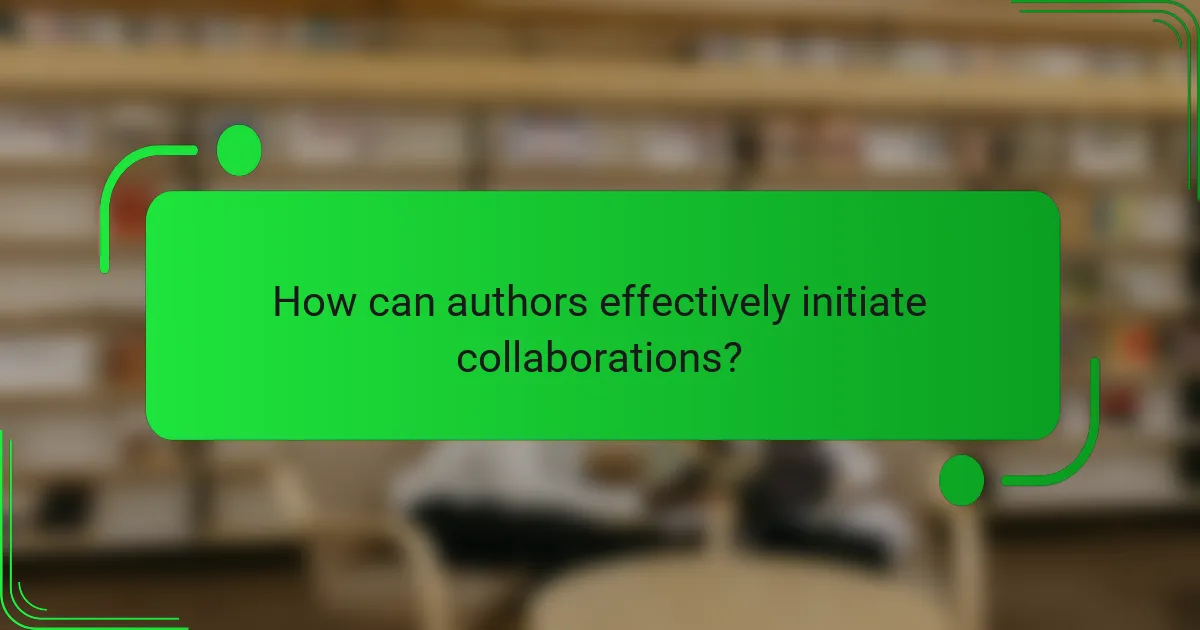
How can authors effectively initiate collaborations?
Authors can effectively initiate collaborations by reaching out with a clear proposal and shared goals. Start by identifying potential partners who complement your writing style or genre. Establishing mutual interests enhances the collaboration’s foundation. Networking at literary events or online platforms can facilitate connections. Clear communication about expectations and timelines is crucial for a successful partnership.
What steps should authors take to find potential collaborators?
Authors should identify potential collaborators by leveraging their networks, attending industry events, and utilizing online platforms. Start by reaching out to fellow writers, editors, or professionals in related fields. Join writing groups or forums to connect with like-minded individuals. Explore social media channels to find authors with similar interests. Consider collaborating on projects that align with both parties’ goals for mutual benefit.
How can authors establish clear communication and expectations?
Authors can establish clear communication and expectations by defining roles, setting deadlines, and maintaining regular updates. Clear agreements on project goals and individual responsibilities enhance collaboration. Utilizing tools for shared documents and communication fosters transparency. Regular feedback sessions help address concerns promptly and align efforts.
What tools can assist in managing collaborative projects?
Several tools can effectively manage collaborative projects. Platforms like Trello and Asana streamline task assignments and progress tracking. Google Workspace facilitates real-time document collaboration, enhancing communication. Slack offers instant messaging for team discussions. These tools improve organization, accountability, and productivity in collaborative environments.
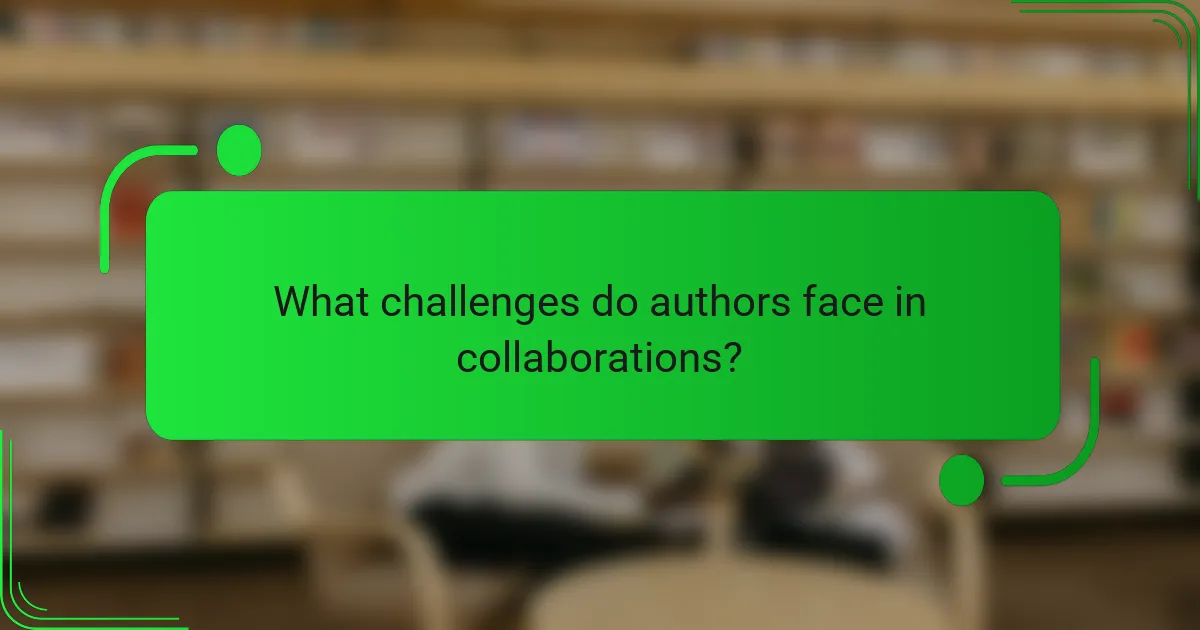
What challenges do authors face in collaborations?
Authors face several challenges in collaborations, including differing creative visions, communication issues, and unequal workload distribution. These factors can lead to conflicts and hinder project progress. Additionally, establishing a clear agreement on roles and responsibilities is crucial to avoid misunderstandings. Trust and mutual respect are essential for a successful partnership.
How can differing writing styles impact collaboration success?
Differing writing styles can significantly impact collaboration success by influencing communication clarity and team dynamics. Teams with diverse styles may experience enhanced creativity, but misalignments can lead to misunderstandings. Establishing common goals and guidelines can help bridge these differences for effective collaboration.
What common conflicts arise during author collaborations?
Common conflicts during author collaborations include differing creative visions, unequal workload distribution, and communication breakdowns. These issues can lead to frustration and hinder project progress. Establishing clear roles, expectations, and open communication channels can mitigate these conflicts.
How can authors navigate copyright and ownership issues?
Authors can navigate copyright and ownership issues by establishing clear agreements before collaboration. Written contracts should outline each author’s rights and responsibilities, including ownership percentages and revenue sharing.
Additionally, understanding copyright laws is essential. Authors should ensure their contributions are clearly defined and protected. Regular communication throughout the project can help address any concerns promptly.
Seeking legal advice can provide further clarity on complex issues, ensuring that all parties are informed about their rights. This proactive approach minimizes disputes and fosters a positive collaborative environment.
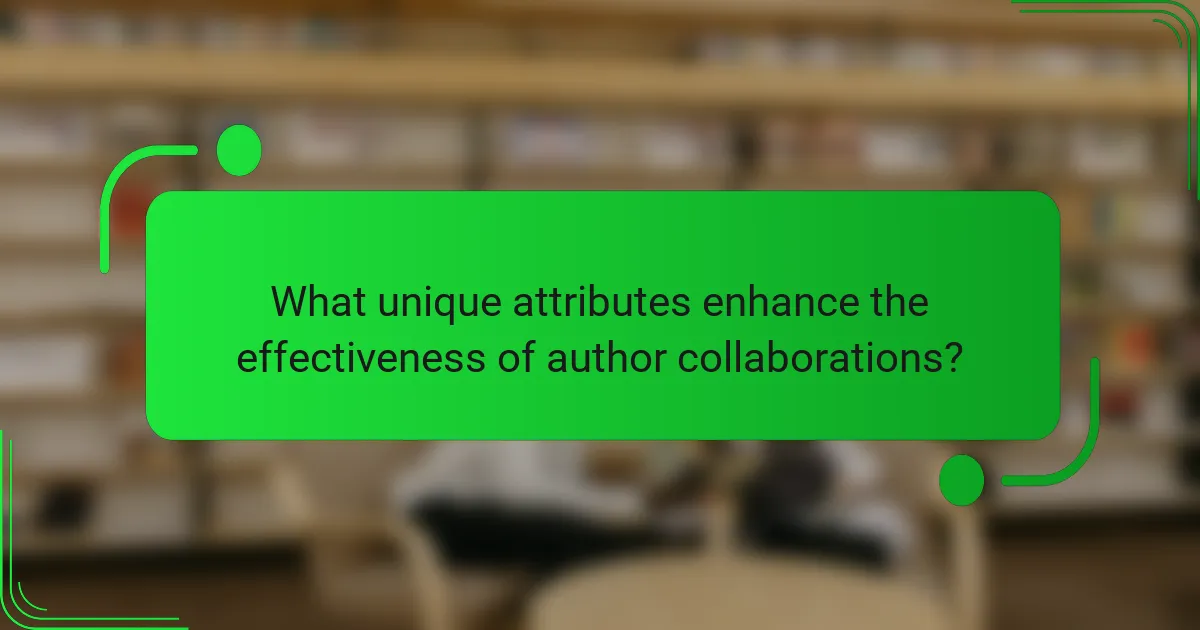
What unique attributes enhance the effectiveness of author collaborations?
Unique attributes that enhance the effectiveness of author collaborations include diverse perspectives, complementary skill sets, and shared networks. These factors foster creativity and broaden audience reach. Collaborative authors often bring unique writing styles and experiences, enriching the content quality. Additionally, mutual accountability can drive productivity and innovation in projects.
How do cultural differences influence collaborative writing processes?
Cultural differences significantly impact collaborative writing processes by shaping communication styles, decision-making, and conflict resolution. Diverse backgrounds can lead to varying interpretations of language, tone, and structure, which may enhance creativity but also introduce misunderstandings. Effective collaboration requires awareness of these differences, fostering an inclusive environment that values diverse perspectives. Adapting to cultural nuances can improve teamwork and produce richer, more innovative written content.
What specific skills can differentiate successful collaborators?
Successful collaborators possess strong communication, adaptability, and conflict resolution skills. These abilities foster effective teamwork and enhance project outcomes. Communication ensures clarity in sharing ideas, while adaptability allows for flexible responses to changing circumstances. Conflict resolution skills help navigate disagreements, maintaining a positive collaborative environment.
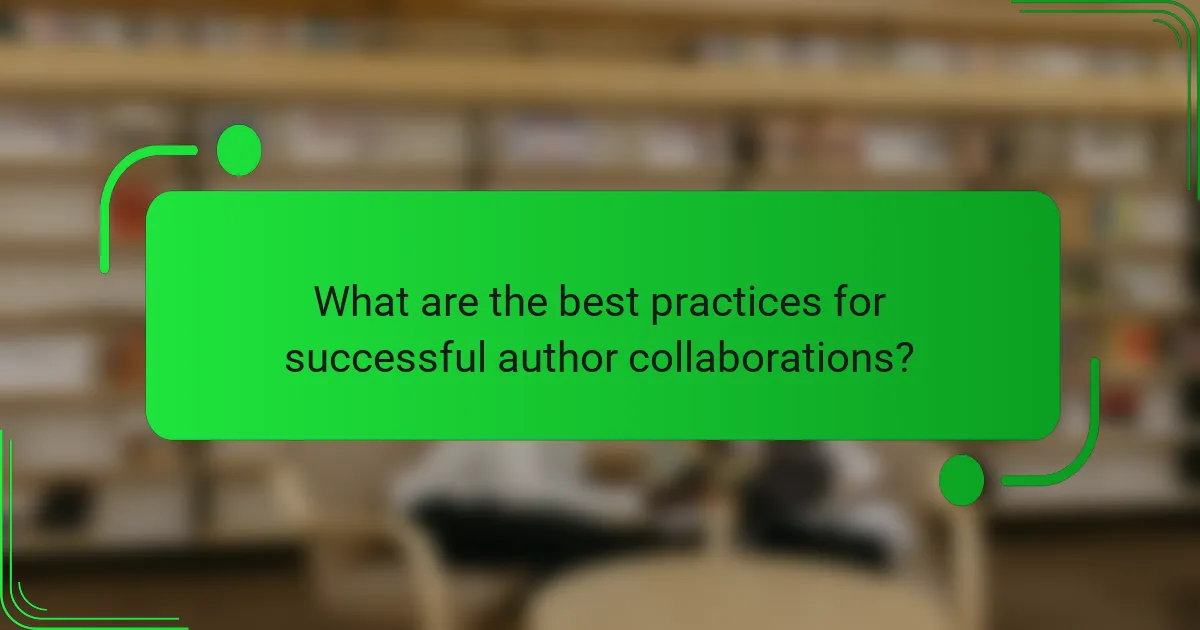
What are the best practices for successful author collaborations?
Successful author collaborations require clear communication, defined roles, and mutual respect. Establishing a shared vision enhances creativity and productivity. Regular check-ins ensure alignment and address any issues promptly. Setting deadlines helps maintain momentum and accountability. Finally, celebrating milestones fosters a positive working relationship.
How can authors create a collaborative writing agreement?
Authors can create a collaborative writing agreement by clearly outlining roles, responsibilities, and expectations. Begin by discussing the project goals and timeline. Next, define how contributions will be credited and how decisions will be made. Include guidelines for communication and conflict resolution. Finally, ensure all parties review and sign the agreement to formalize the collaboration.
What strategies can help maintain motivation and accountability?
Collaborations with other authors can enhance motivation and accountability through shared goals and support. Establish clear communication channels with collaborators to set expectations and deadlines. Regular check-ins can help maintain focus and encourage progress. Additionally, celebrating small milestones together fosters a sense of achievement.
What are common mistakes to avoid in author collaborations?
Common mistakes in author collaborations include poor communication, unclear roles, lack of a shared vision, and ignoring deadlines. These issues can lead to misunderstandings and project delays. Establishing clear expectations and maintaining open dialogue can help mitigate these risks. Additionally, not addressing conflicts early can damage relationships and hinder productivity. Prioritizing collaboration tools and regular check-ins can enhance teamwork.

